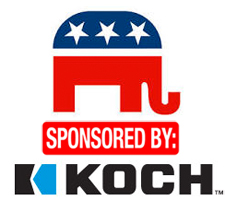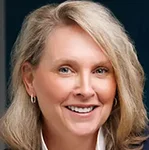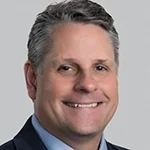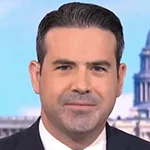January marked the fifth anniversary of the Supreme Court’s landmark Citizens United ruling that deregulated corporate campaign spending, and five years later, a shockingly tight-knit cadre of wealthy industrialists now plays a markedly pronounced role in shaping our elections and selecting our future leaders. Who knew?
 Case in point: The New York Times in January reported that conservative activists Charles and David Koch now plan to spend nearly $900 million during the 2016 election cycle vis-à-vis the exceedingly deep pockets of their numerous political networks. This astounding figure is on par with spending projections for our upcoming Democratic and Republican presidential candidates, an amount one political advisor likened to Reuters in January an “electoral arms race.”
Case in point: The New York Times in January reported that conservative activists Charles and David Koch now plan to spend nearly $900 million during the 2016 election cycle vis-à-vis the exceedingly deep pockets of their numerous political networks. This astounding figure is on par with spending projections for our upcoming Democratic and Republican presidential candidates, an amount one political advisor likened to Reuters in January an “electoral arms race.”
The Koch siblings, and the vast network of donors and advocacy groups affiliated with their $115 billion Wichita-based empire, come with financial coffers so prodigious, so undeniably influential, that Politico in January said they now rival the Republican Party in their “ability to shape policy debates and elections.”
The Kochs’ affiliated networks spent nearly $400 million during the 2012 election cycle and $300 million during the 2014 Midterms. Its juggernaut $900 million proposal for 2016 — to be bankrolled, in part, through Koch-related advocacy groups like Americans for Prosperity — inspired the New York Times in January to refer to the Koch network as “an almost shadow version of the Republican Party.” Koch Industries, the second-largest privately held company in the U.S., is now the life force of the modern conservative movement.
Patronage Pilgrimage
In January, U.S. Senators and Presidential-hopefuls Marco Rubio, Rand Paul and Ted Cruz traveled to the Kochs’ annual, invitation-only winter seminar at a resort near Palm Springs, Calif., to audition for the brothers and hopefully tap into their pools of power-donors.
Five years ago it may have seemed premature to campaign for an election 18 months away, but in a post-Citizens United world there’s a new political rite of passage, a pre-primary primary, if you will (the Palm Springs event, organized by Koch-affiliated nonprofit Freedom Partners, was christened by the New York Times on January 20 “The Koch Primary.”). With this kind of money at stake, getting on the Kochs' good side is a must for the 2016 Republican Party nominee.
This is the political landscape in 2016. A small, monolithic network of mega-rich have unprecedented influence in making or breaking a political candidate’s future. Citizens United’s disastrous effects on elections can especially be illustrated in recent Congressional elections: according to a January study published by the Brennan Center, titled “Election Spending 2014: Outside Spending in Senate Races Since Citizens United,” spending in Senate races has more than doubled by outside groups since 2010. In the five years since Citizens United’s passage, Senate races have seen more than $1 billion in super PAC funding, and about 60% of those funds came from only 195 people.
Of course, super PACs are obligated by law to disclose their donors, and a key provision behind Citizens United’s passage was that outside fundraising groups would be prohibited from coordinating their work with the candidates they support. As we’ve seen, however, many outside fundraising entities — like the Kochs’ beloved Freedom Partners, for example — fall under the nonprofit umbrella of Section 501(c) of the U.S. tax code (among them are social welfare organizations and business trade associations), and as such, don’t have to divulge their roster of donors or how much they give.
The prevalence of “dark money,” or funding from undisclosed donors, has exploded in elections. An October 2014 report released by Public Citizen found that many of these outside spending groups are led by candidates’ former staff or funded entirely by a candidate’s family, and that 42% of these groups that have spent more than $100,000 have devoted all their spending to a single candidate.
According to the Public Citizen report, “…many of the groups that Citizens United has spawned are essentially extensions of the candidates and parties that they serve … the existence of outside unregulated groups that serve individual candidates and parties has provided an easy end-around for those seeking to avoid the laws limiting contributions to candidates.” So much for transparency.
The proliferation of corporate influence in America’s election process has become an issue of the times. Several hundred plutocrats now set the agenda, pick the leaders, then attack the issues in their way (environmental regulations, climate change legislation, and of course, campaign disclosure laws are among them). A select few benefit from the laws passed for all. According to an ABC poll published shortly after Citizens United’s passage, 80% of Americans opposed the SCOTUS ruling.
Five years later, we know that even if money can’t buy love, it can buy a friend.


 Maggie Moran, who is well-connected in New Jersey and New York Democratic politics, has established Moxie Strategies in Asbury Park, NJ.
Maggie Moran, who is well-connected in New Jersey and New York Democratic politics, has established Moxie Strategies in Asbury Park, NJ. Husch Blackwell Strategies has added FleishmanHillard alum Michael Slatin as a principal in its public affairs group.
Husch Blackwell Strategies has added FleishmanHillard alum Michael Slatin as a principal in its public affairs group. Rory Cooper, a veteran Republican operative and policy specialist, has joined Teneo’s Washington office as senior managing director in its strategy & communications practice.
Rory Cooper, a veteran Republican operative and policy specialist, has joined Teneo’s Washington office as senior managing director in its strategy & communications practice. Brian Fallon, who served as national press secretary for Hillary Clinton’s 2016 presidential run, is signing on next month as Vice President’s Kamala Harris’ campaign communications director.
Brian Fallon, who served as national press secretary for Hillary Clinton’s 2016 presidential run, is signing on next month as Vice President’s Kamala Harris’ campaign communications director. TikTok is nothing more than a Chinese propaganda tool that poses “a grave threat to America’s national security and, in particular, impressionable children and young adults,” say two Congressmen who want the platform registered as a foreign agent.
TikTok is nothing more than a Chinese propaganda tool that poses “a grave threat to America’s national security and, in particular, impressionable children and young adults,” say two Congressmen who want the platform registered as a foreign agent.


 Have a comment? Send it to
Have a comment? Send it to 
No comments have been submitted for this story yet.